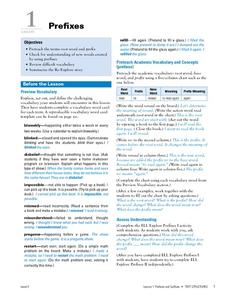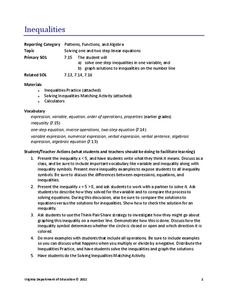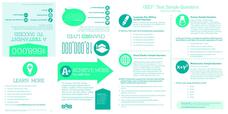Nancy Fetzer's Literacy Connections
Expository Paragraph
Upper elementary and middle school writers learn how to craft an expository paragraph by following the six steps detailed in a 48-page instructional guide. Learners learn how to write six different types of informational paragraphs:...
EngageNY
Presentation of Events: Comparing Two Authors
Give a little clue! Readers learn how context clues can help them determine the meaning of words by viewing a Context Clues Resource sheet then completing a Context Clues
practice sheet. They then compare events presented by two...
Curated OER
Phrases and Clauses
Clarify the different types of phrases and clauses that young writers can use to vary their sentence structure. A helpful slideshow presentation encourages your class to fix sentences by adding more interesting phrases and clauses,...
Houghton Mifflin Harcourt
Special Friends: English Language Development Lessons (Theme 9)
Enhance language proficiency with a Special Friends themed English language development unit. Each lesson follows a listen, speak, move, and/or look routine that is guaranteed to get your scholars discussing topics such as animal...
Read Write Think
Poetry Portfolios: Using Poetry to Teach Reading
Over the course of five periods, scholars create a poetry portfolio. They begin with a reading of the poem, Firefly. With a focus on vocabulary, learners reread the poem then look for sight words and other skills.
Missouri Department of Elementary
Finding the Positive
To instill the importance of a positive classroom community small groups create a collage out of magazine clippings that highlight three characteristics of self-awareness. Written examples accompany the finished product. Groups turn in...
K20 LEARN
Who's Coming To Dinner? Descriptive Writing
"The Dinner Party" is the anchor text in a lesson designed to encourage writers to use sensory details in their stories. After brainstorming descriptive words and phrases for the five senses, class members read Mona Gardner's...
Trinity University
Explain Yourself: An Expository Writing Unit for High School
Introduce expository writing with a unit that asks writers to craft an essay to explain a belief, value, or priority that is important to them. Mini-lessons within the unit focus on crafting thesis statements and conclusions, selecting...
Core Knowledge Foundation
First Grade Skills Unit 7
The last unit in the series by Core Knowledge focuses on alternative spellings, nouns, verbs, conjunctions, subject-verb agreement, using commas in a series, constructing sentences, and following the writing process while writing...
Resources for Educators
Math & Science Connection
Whether you're using a collection of Dr. Seuss books to teach basic math skills like counting, adding, and subtracting, or exploring the different states of matter by melting a crayon with a hairdryer, a series...
Workforce Solutions
Workforce Solutions K-1 Lessons
Three lessons and one at-home connection explore 12 professions. In the first lesson, scholars examine an online map that displays all 12 careers alongside a video. Lesson two challenges class members to choose two of those careers to...
British Council
Unit 8: Proofreading
Plagued by punctuation or stymied by spelling? Lesson eight in a nine-part series of career education and skills activities introduces the importance of proofreading. Learners categorize common writing errors and construct error-free...
Perfection Learning
Prefixes, Suffixes, and Root Words/Base Words
Get your class on track with their affixes by covering prefixes, suffixes, and root words in depth. This short three-lesson unit includes vocabulary lists to study, detailed plan procedures, and some accompanying worksheets.
Science Matters
Blubber Gloves: It’s All About Insulation
Instill the concept of adaptation with the help of Blubber Gloves—ziplock bags, shortening, and duct tape. Scholars discuss how animals and plants keep warm in polar regions, record their predictions, and try on their Blubber Gloves to...
Simon & Schuster
Curriculum Guide: The Scarlet Letter
The Scarlet Letter may be a classic, but keeping high schoolers engaged in the reading of Hawthorne's vocabulary, syntax, imagery, and historical references presents it own set of challenges. Here's a guide that offers readers...
Meadows Center for Preventing Educational Risk, University of Texas at Austin
Lesson 9 - Contractions
Is it do'nt or don't? How about doesn't or does'nt? A lesson on contractions helps learners identify, form, and use contractions. Components within the plan include direct instruction on decoding and encoding contractions, as well as...
Southern Nevada Regional Professional Development Program
Pardon Me, Your Modifier is Dangling
Lost! (or misplaced) a modifier. Last seen dangling at the end of a sentence! Reward offered! To underscore the humor, class members are each given a sample sentence to illustrate (A woman passed by, leading a Springer Spaniel, in a...
Fallbrook Unition Elementary School District
Narrative Writing
Enhance narrative writing instruction with engaging and interactive planning pages. Eight lessons take authors through the process of writing a narrative story, two lessons prompt writers to create a personal narrative, and a...
TV411
Dependent and Independent Clauses Join Forces
Young grammarians are often confused by clauses, especially the difference between dependent and independent clauses. Clarify the confusion with a color-coded worksheet that clearly defines and illustrates the differences and then gives...
K12 Reader
Antonyms are Opposites
Knowing the opposite of your chosen word is a great step in improving your word choice. Young readers select an antonym from the provided word bank to complete a series of 14 sentences.
Virginia Department of Education
Inequalities
Not all resources are created equal — and your class benefits! Scholars learn how to solve one-step inequalities using inverse operations. They complete an activity matching inequalities to their solutions.
GED Testing Service
Achieve More: The GED Test
By 2018, 63% of US jobs will require a college degree or professional certificate. This is just one of the many great informational points you'll find on this handout, which you can use to inform your student body with the necessary...
National Endowment for the Humanities
Soviet Espionage in America
The war against Communism and Joseph McCarthy’s place in it are the focus of a series of three lessons examining postwar America from 1945-1950. This first lesson asks groups to read an introduction that describes the Verona Project and...
Houghton Mifflin Harcourt
Incredible Stories: Challenge Activities (Theme 3)
Real or fantasy? Dogzilla, the Giant of Barletta, the Garden of Abdul Gassazi. To enrich their understanding of incredible stories, teams create a mouse newspaper and report on the invasion of Dogzilla, craft folktales, and draft a...























